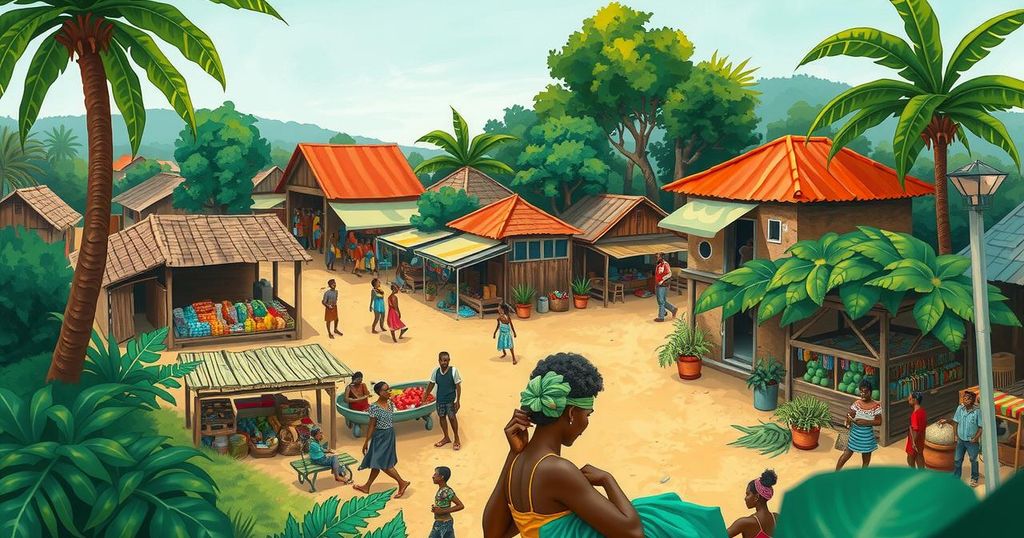Liberia’s Socio-Economic Landscape: Insights from the Afrobarometer Round 10 Survey

A conference convened by the Center for Democratic Governance discussed the findings of the Afrobarometer Round 10 survey, which showcased the divided perspectives of Liberians on economic conditions, governance, and climate change. Significant insights included strong support for democracy, concerns over local governance engagement, and pressing migration issues. The necessity for urgent policies to address citizens’ concerns was emphasized, particularly regarding climate action and women’s rights.
On March 13, 2025, the Center for Democratic Governance hosted a significant conference at the Corina Hotel, attracting various partners and donors to discuss critical issues affecting Liberia. The focus was on the findings from the Afrobarometer Round 10 survey, which explored themes such as climate change, economic conditions, migration, and international relations from the perspective of Liberians regarding their future.
Mr. Elkanah Y. Taylor, the Program Coordinator at the Center, presented an extensive overview of the survey’s methodology and outcomes, highlighting divergent opinions among citizens about Liberia’s future. The survey indicated a notable split: while 50% of respondents believe the nation is on the right path, an equal percentage disagrees. Regarding economic conditions, 48% rated the situation poorly, compared to 45% who offered a favorable view. Personal living conditions mirrored this division, with 46% expressing dissatisfaction and a similar proportion feeling content. Notably, 61% anticipated positive economic changes in the upcoming year, alongside improved government performance ratings.
Taylor emphasized that Liberians overwhelmingly reject authoritarian governance, with strong support for democratic principles. Findings revealed that 79% of local government councilors and 88% of parliamentary members are perceived as inadequately engaged with the populace. Alarmingly, 66% believe that criminal officials rarely face consequences, while 58% are concerned about political interference affecting judicial fairness.
The survey also examined external influences, finding that 68% of respondents consider China’s economic role in Liberia significant. Conversely, 86% view American influence favorably, while 79% and 58% have positive sentiments about China’s and India’s impacts, respectively. Only 39% expressed similar views towards Russia. Additionally, over three-quarters recognized the constructive roles of ECOWAS and AU in Liberia’s political landscape, stressing the importance of maintaining diplomatic neutrality in the ongoing Russia-Ukraine conflict.
Climate change awareness was another crucial focus, with 68% of Liberians acknowledging the issue. Alarmingly, 71% believe climate change worsens living conditions in Liberia. A significant consensus emerged, with 82% asserting that both the government and wealthier nations must prioritize actions against climate change. The majority (81%) supported governmental policies for investments in renewable energy and infrastructure to address environmental challenges.
Regarding women’s rights and health autonomy, the survey indicated that 78% of Liberians believe women should have the choice of when to marry and have children, while 77% advocate for continuing education for pregnant girls. Furthermore, 61% considered abortion justifiable under certain conditions, such as health risks to the mother or pregnancies resulting from rape.
Migration remains a pressing issue, with 77% of respondents contemplating leaving Liberia, particularly among the educated and employed. Economic opportunities were cited as the primary motivation for potential emigration, with 52% favoring North America as their preferred destination.
The survey results present a nuanced picture of Liberia’s socio-economic condition, highlighting the urgent necessity for responsive policies that address the economic, social, and environmental concerns of its citizens while promoting a more inclusive and democratic society.
The Afrobarometer Round 10 survey reveals a complex socio-economic landscape in Liberia characterized by diverging opinions on governance, economic conditions, and pressing issues such as climate change and women’s rights. The overwhelming support for democracy and the call for international engagement reflect the citizens’ aspirations for an improved future. Urgent action is required from both the government and international partners to implement policies that address these concerns and enhance residents’ quality of life.
Original Source: frontpageafricaonline.com








